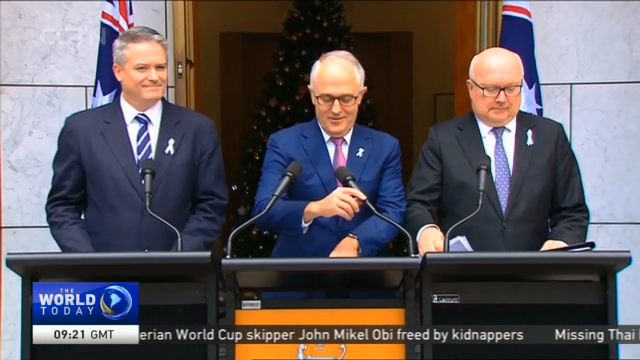
18:49, 03-Jul-2018
Australia Foreign Interference Law: Critics say legislation threatens to further strain ties with China
Updated
17:48, 06-Jul-2018
03:20

Australia's government says sweeping new national security laws will help better protect the country. But critics contend the legislation raises concerns about Australia's democratic process, and threatens to further strain its relationship with China. Greg Navarro explains.
Last week, the effort to pass laws aimed at preventing foreign interference and influence in Australia was led by the country's attorney general.
CHRISTIAN PORTER AUSTRALIAN ATTORNEY GENERAL "They are meant to protect Australia from any known or emerging or future threat."
The new laws ban foreign interference in politics and expand espionage charges.
Some critics believe the legislation will have a greater impact on personal freedom.
MORRY BAILES, PRESIDENT LAW COUNCIL OF AUSTRALIA "What we are concerned about is that by criminalising some conduct, we are going to discourage people having legitimate political and democratic discussions."
CHRISTIAN PORTER AUSTRALIAN ATTORNEY GENERAL "They are not bills that are about any particular democratic process. But the Espionage Bill, for instance, will, when it is passed, make for the first time, it illegal, a criminal offence, for a foreign government to intentionally or recklessly interfere with a government political process or a democratic process such as an election."
GREG NAVARRO SYDNEY "The reforms were announced last year amid a political donations scandal that led to the resignation of one Australian senator."
Sam Dastyari was forced to step down after reports linked him to donations from a Chinese businessman and raised concerns about foreign influence in Australian politics.
That prompted this statement from Australian Prime Minister Malcolm Turnbull.
MALCOLM TURNBULL AUSTRALIAN PRIME MINISTER "We have recently seen disturbing reports about Chinese influence. I take those reports very seriously as do my colleagues."
That statement and the legislation have threatened to further strain ties between the two countries.
HUA CHUNYING, SPOKESPERSON CHINESE FOREIGN MINISTRY "Regardless of whether this legislation has a specific target or not, China's position is clear. China develops relations with other countries on the basis of mutual respect and non interference.
Last year, China and Australia traded 184 billion AUD worth of goods between each other.
Professor Hans Heidrichke of the University of Sydney warns if the diplomatic relationship is seen as unfriendly or hostile, it could begin to take an economic toll in Australia.
PROF. HANS HEIDRICHKE CHINESE BUSINESS AND MANAGEMENT, UNIVERSITY OF SYDNEY "For example, here in the business school we have 4,000 Chinese students, if the value of their degrees in China goes down, if people are skeptical on the relations then that will have a flow on effect through us, to other universities so that is a problem that will emerge over time unless the government is able to counter balance what is at the moment a rather negative perception of where relations are."
DEPUTY DIR. JAMES LAURENCESON AUSTRALIA CHINA RELATIONS INSTITUTE, UNIVERSITY OF TECHNOLOGY SYDNEY "There was a survey of Chinese investors recently in Australia done two weeks ago and it found that only one third of Chinese investors in this country felt welcomed. Now look, that is a worry. Australia is obviously a country that relies on foreign investment."
Australia's government has repeatedly sought to diffuse any bilateral tensions.
MALCOLM TURNBULL AUSTRALIAN PRIME MINISTER "Now from time to time there will be differences in terms of issue, particular issues, but the important thing is we deal with them as friends with respect."
Because, Prime Minister Malcolm Turnbull said in Canberra last week, mutual respect is the key, and he believes the relationship between the two countries remains strong. Greg Navarro, CGTN, Sydney.

SITEMAP
Copyright © 2018 CGTN. Beijing ICP prepared NO.16065310-3
Copyright © 2018 CGTN. Beijing ICP prepared NO.16065310-3